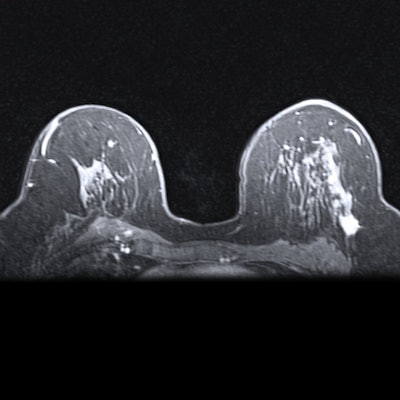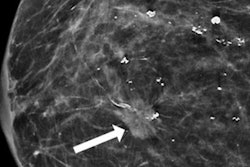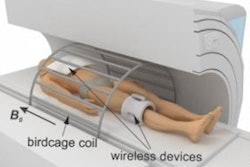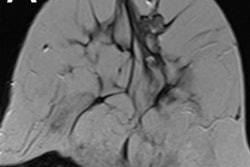
Preoperative breast MRI finds 11% more cancer in women with ductal carcinoma in situ (DCIS) -- suggesting that using MRI for these women could improve surgical planning and outcomes, according to a study published on 20 June in the European Journal of Radiology.
"Preoperative identification of invasive disease and delineation of disease extent in patients with DCIS is necessary to inform surgical decision-making," wrote a team led by Dr. Leslie Lamb of Massachusetts General Hospital in Boston. "For example, if invasive cancer is identified prior to surgery rather than during the initial surgery, then sentinel lymph node biopsy can be performed at the initial surgery."
DCIS makes up 20% of breast cancers, and it usually appears as calcifications on mammography. Since breast MRI has a higher sensitivity than mammography, it can find both calcified and noncalcified DCIS, and the modality is being used more and more as a preoperative tool in women with invasive breast cancer.
But breast MRI's efficacy in women with DCIS remains unclear. So Lamb and colleagues investigated whether preoperative MRI in women with DCIS would find more cancers and thus affect surgical planning.
The study included 963 women with calcifications on mammography that were determined to be DCIS at core biopsy between 2007 and 2016. Of these, 236 (24.5%) underwent breast MRI; these women tended to be younger, less likely to have prior breast cancer, and more likely to have dense breast tissue than those who did not undergo breast MRI.
Of the 236 women who had preoperative breast MRI, 66 (28%) had 80 findings that were recommended for further workup and/or biopsy. Twenty-one women had 23 MRI findings that were not followed up before surgery, while 45 patients with 57 MRI findings underwent biopsy alone; of these, 37.6% were benign, 17.5% showed high-risk pathology, and 43.9% were malignant.
Preoperative MRI found 26 cancers in 24 women, for an additional cancer detection rate of 11.2%; of these 26 cancers, half were invasive. The group also found that the mastectomy rate in women in whom MRI identified additional cancers was quite a bit higher than the initial planned mastectomy rate, while the reexcision rate among women who underwent preoperative MRI was comparable with those who did not.
| Performance of preoperative MRI in women with DCIS | |||
| Measure | No MRI group | Preoperative MRI group | P-value |
| Initial mastectomy rate, total study cohort | 19.4% | 34.3% | < 0.001 |
| Reexcision rate | 37.4% | 36% | 0.85 |
| Mastectomy rate in 24 women in whom MRI found additional cancer | -- | 87.5% | -- |
| Positive predictive value of biopsies performed | -- | 45.6% | -- |
The bottom line? MRI should definitely be considered as a preoperative tool in women diagnosed with DCIS, Lamb and colleagues concluded.
"In this selected patient cohort, approximately one in 10 women with biopsy-proven DCIS had additional sites of cancer identified at MRI that would impact surgical management," the team wrote.



















